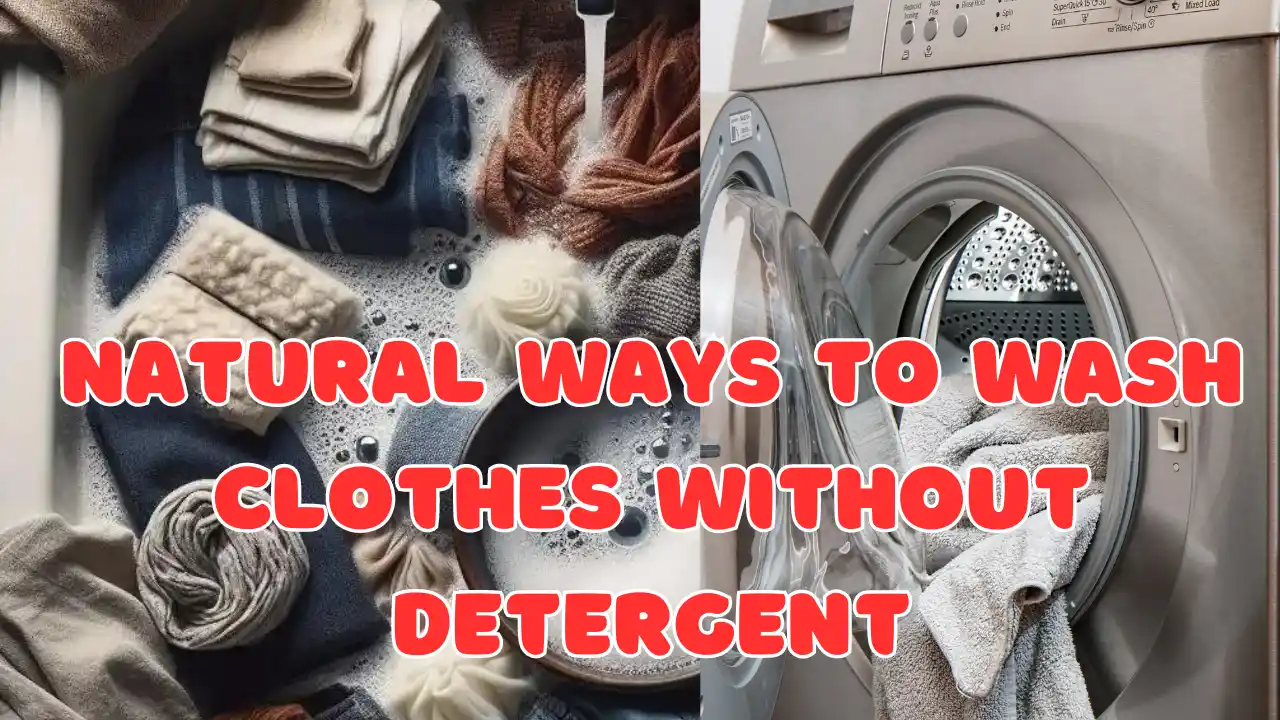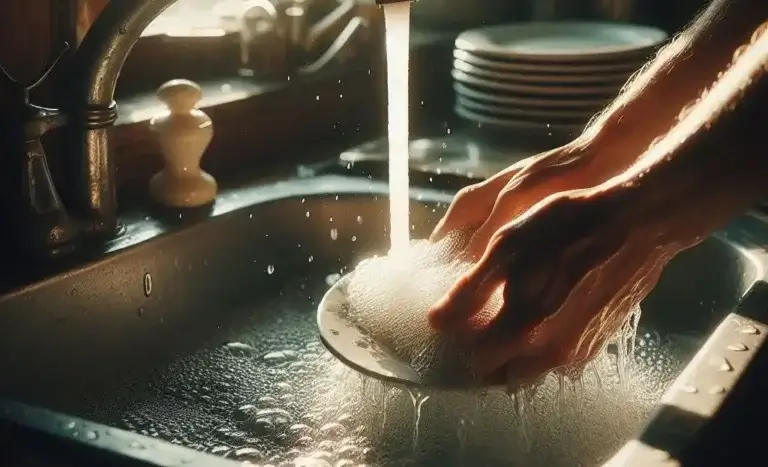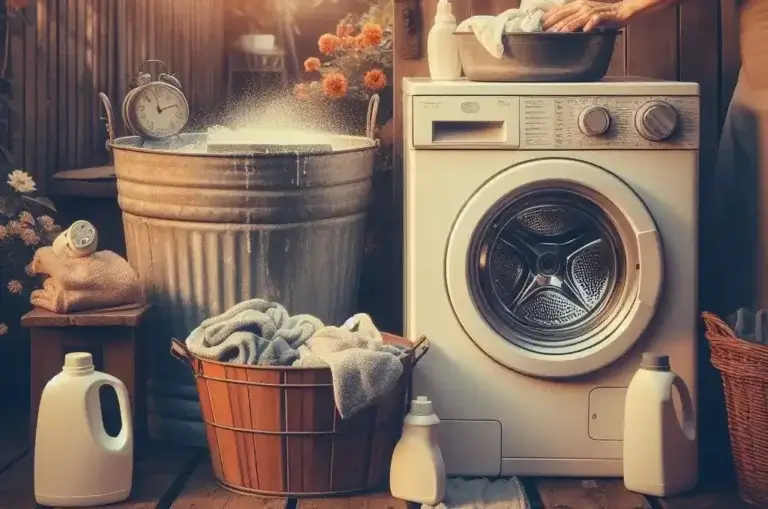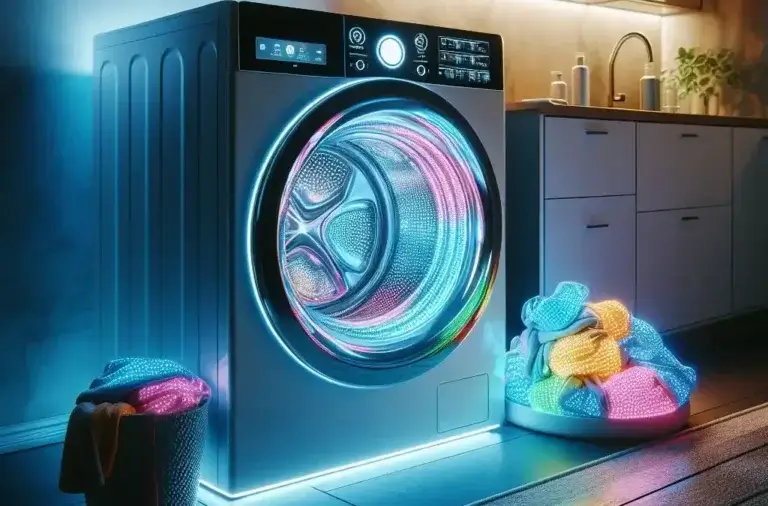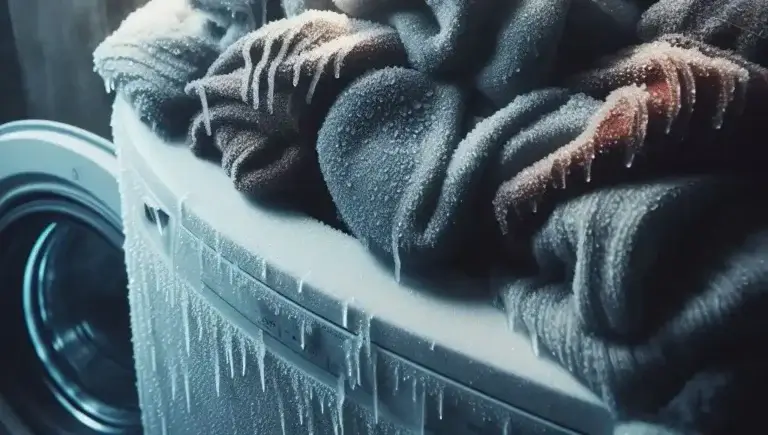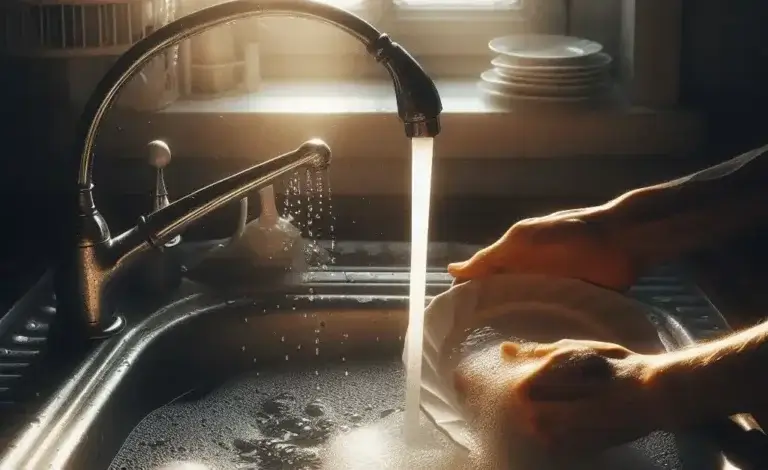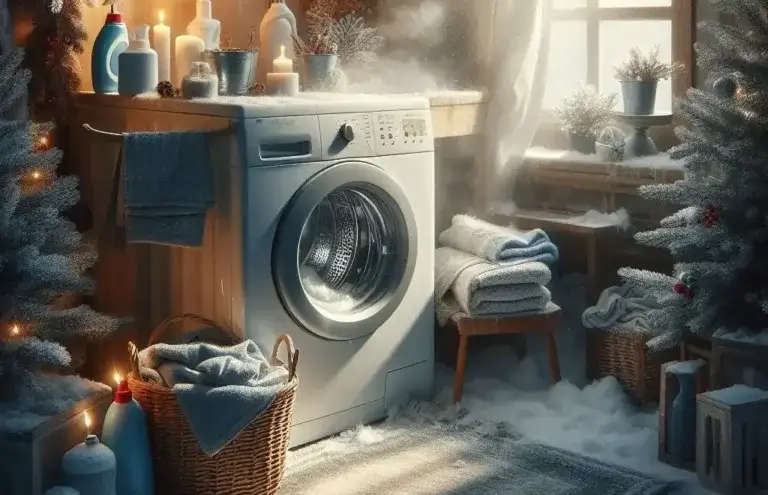Natural Ways to Wash Clothes Without Detergent – Laundry Detergent Alternatives
Have you ever found yourself staring at a pile of dirty laundry, only to realize you’ve run out of laundry detergent? We’ve all been there – detergent seems to disappear when you need it most. But before you run to the store or resort to questionable cleaning methods, know that there are plenty of natural ways to get your clothes clean without detergent.
In this comprehensive guide, we’ll explore various laundry detergent alternatives and homemade options using ingredients you likely already have in your kitchen. From vinegar and baking soda to soap and lemon, we’ve got you covered on how to wash clothes without detergent effectively. We’ll also provide tips on stain removal, best practices for certain fabrics, and answers to frequently asked questions.
So read on to learn the secrets of detergent-free washing, and take the stress out of your next laundry day!
Table of Contents
Why Wash Clothes Without Detergent?
Before we dive into the methods, let’s look at why you might want to wash laundry without detergent in the first place:
- You’ve run out – We’ve all experienced the frustration of discovering an empty detergent bottle when faced with a pile of dirty clothes. Going detergent-free allows you to clean clothes until you can restock.
- Sensitive skin – Some people find that detergents, even those labeled as “sensitive”, cause skin irritation. Using natural alternatives eliminates this issue.
- Save money – Commercial detergents can get pricey. With homemade cleaners made from pantry staples, you can wash clothes on the cheap.
- More eco-friendly – Conventional laundry detergents contain chemicals and nutrients that can pollute waterways. Choosing natural, biodegradable ingredients is better for the planet.
Now let’s look at what you can use instead…
Laundry Detergent Alternatives and Substitutes
Luckily, you have plenty of options to get your clothes clean without heading to the store for detergent. Here are some of the most effective ingredients and products to use:
Vinegar
White vinegar is mildly acidic, which helps to dissolve dirt and oils in fabric. It also acts as a natural whitener and brightener.
How to use: Add 1/2 to 1 cup vinegar to the washing machine tub before adding clothes. Run a normal wash cycle. The smell dissipates when clothes dry.
Baking Soda
Baking soda is alkaline and helps lift stains via a chemical reaction. It’s a natural deodorizer too.
How to use: Add 1/2 cup baking soda along with vinegar, or just baking soda alone. It’s fine for all wash cycles.
Lemon Juice
Like vinegar, lemon juice helps remove dirt and stains with its acidity. It also leaves a light, fresh scent.
How to use: Mix the juice of 2-3 lemons with water. Add to the wash. Great for whitening.
Borax
A powdered mineral cleaner, Borax helps remove stains by chemically reacting with them. It leaves behind a fresh scent too.
How to use: Add 1/2 cup Borax to wash water with clothes. It’s safe for all cycles.
Washing Soda
An alkaline cleaner that helps lift dirt and stains. It’s more heavy-duty than baking soda.
How to use: Add 1/2 cup to wash water. Best for hot washes and stubborn stains.
Bar Soap
Grating a few bars of soap to flakes/powder makes an effective detergent substitute.
How to use: Grate 4-5 bars into flakes, then add the powder to the wash cycle. Also works for hand washing delicates when mixed into water.
Body Wash or Shampoo
In a true bind, liquid soap/shampoo can work to wash clothes clean in small amounts.
How to use: Add roughly 1/4-1/3 cup body wash or shampoo to wash water. Use for delicate cycles.
Dishwashing Detergent
Dish soap helps cut through grease on dishes – and clothes too. Just don’t overdo the amount.
How to use: Add 2-3 tablespoons of dish detergent to wash. Good for delicates in this quantity.
Natural Ways to Wash Clothes Without Detergent – Full Guide
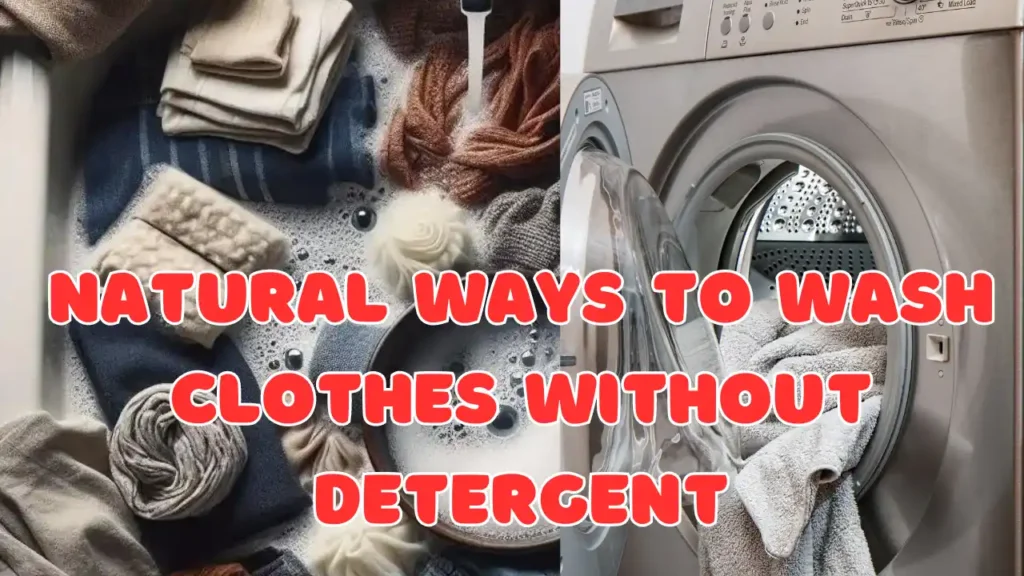
Concerned about the harsh chemicals in conventional laundry detergents? Seeking eco-friendly ways to lessen your impact on the environment? Or perhaps you’ve simply run out of detergent and need a quick solution? Fortunately, nature offers several effective alternatives that can keep your clothes clean and fresh without relying on store-bought detergents.
Here are some natural cleaning powerhouses to explore:
1. Baking Soda:
- This versatile kitchen staple is a natural deodorizer and cleanser.
- Add ½ cup of baking soda to your washing machine to combat odors and tackle stains.
- It’s particularly effective for sportswear, towels, and pet-related items.
2. White Vinegar:
- This acidic wonder works wonders for softening fabrics, removing soap residue, and brightening whites.
- Add ½ cup of white vinegar to the rinse cycle for a natural fabric softener and odor eliminator.
- Don’t worry, your clothes won’t smell like vinegar once dry!
3. Lemon Juice:
- This natural brightener and stain remover adds a fresh scent to your laundry.
- Add ½ cup of lemon juice to the wash cycle to brighten whites and tackle stains.
- It’s especially effective for removing stains from sweat and body oils.
4. Wash Nuts:
- These dried berries from the soapberry tree contain saponin, a natural cleaning agent.
- Place 5-6 soap nuts in a cloth bag and toss it in with your laundry for a gentle and effective clean.
- They’re reusable and can last for multiple washes.
5. Borax:
- This naturally occurring mineral is a powerful stain remover and deodorizer.
- Add ½ cup of borax to your wash cycle to boost cleaning power and eliminate stubborn odors.
- Handle with care and avoid direct contact with skin, as it can be mildly irritating.
Additional Tips for Success:
- Pre-treat stains: Apply a paste of baking soda and water to the stains before washing for better stain removal.
- Soak heavily soiled items: Soak them in a mixture of baking soda and water for a few hours before washing.
- Adjust amounts: Experiment with different amounts of natural ingredients to find the best results for your laundry needs.
- Air-dry whenever possible: This conserves energy and helps preserve fabrics.
By embracing these natural alternatives, you can enjoy clean, fresh laundry while reducing your reliance on harsh chemicals and protecting the environment.
Laundry Booster Tricks
In addition to alternates for detergent, here are some laundry “booster” ingredients you likely have on hand. Using these along with the previous substitutes helps ensure clothes get extra clean:
- Salt – 1/2 to 1 cup of salt helps lift stains and soften water so substitutes work better
- Hydrogen peroxide – 1/2 cup whitens clothing and helps remove stubborn stains
- Distilled white vinegar – 1/2 cup helps remove sweat/deodorant residue and brightens whites
- Baking soda – 1/2 cup lifts stains via chemical reaction
- Borax – 1/2 cup (in addition to using alone) boosts stain-fighting
- Lemon juice – The juice of 1 lemon cut detergent resides and freshens the scent
- Essential oils – 10-15 drops adds light fragrance to washed clothes
So when using a homemade detergent alternative, consider adding one of these laundry boosters too for maximum cleaning power!
Best Practices for Washing Clothes Without Detergent

While the ingredients above make effective laundry detergent substitutes, there are some best practices to follow for optimal results:
Wash Similar Fabrics Together
Whenever possible, wash fabrics of similar type together – especially delicate materials like wool and silk. This allows you to adjust the wash temperature and process to what’s safest for that fabric type.
Soak Heavily Soiled Clothing
If clothes are very dirty, soak them for 30-60 minutes in warm water with your cleaning substitute (and booster) before washing. This helps loosen stains so ingredients work better during agitation.
Use Warmer Water Temps
Hot or warm water allows stain and dirt-busting ingredients to work more effectively. Starting with cold rinses clothes less efficiently.
Increase Agitation
More agitation equals more rubbing of garments together – and more cleaning action. Opt for higher spin speeds or longer wash durations.
Double Rinse
Run clothes through a second rinse cycle to remove more residue and cleaner buildup leftover from the substitutes used. This leaves clothes fresher.
Line or Air Dry
If possible, skip the dryer and allow clothes to line or air dry. This gives the fresh breeze more time to naturally neutralize any scent lingering from vinegar, lemon juice, etc.
Now that we’ve covered the basics, let’s dive into…
Answers to Common Laundry Detergent Questions
Doing laundry without detergent likely brings up many questions if it’s new to you. So in this section, we’ll tackle some of the most frequently asked:
Will clothes get clean without detergent?
Yes! While commercial detergents make washing most convenient, the many natural ingredients listed above effectively remove dirt, oil, and stains too. They’ve been used for generations to launder clothing. Just allow the substitute time to work by soaking garments beforehand if heavily soiled.
How much vinegar, baking soda, lemon juice, etc. should I use?
We’ve included recommended amounts under each ingredient. However, they’re flexible depending on load size and dirtiness level. For a “standard” load with average soil, start with 1/2 cup vinegar, baking soda, or lemon juice. Borax and washing soda, 2-3 tablespoons. Liquid soap around 1/4 cup. Adjust as needed!
Can I combine substitutes like vinegar and baking soda?
Yes! Vinegar and baking soda are two primary laundry cleaners that work better together. The acid in vinegar reacts with the alkaline baking soda, creating an effervescent, cleaning reaction when combined with water. For max stain fighting, add them together along with stained clothes in warm soak water.
Do I need to use fabric softener too?
No – -vinegar and hair conditioner (see more below) naturally soften the fabric and remove residue. Adding other softeners on top tends to leave buildup behind. Vinegar’s acidity specifically helps dissolve any sticky residue clinging to cloth fibers.
What temperature should I wash with alternates at?
For everyday laundry, warm water is ideal. For set-in stains or heavily soiled clothes, use hot water. Vinegar, lemon, borax, and the like need higher temps to react and penetrate fibers best. Cold slows the process. Exceptions would be delicates and wool – follow garment instructions.
Which products clean best for whites vs. colors?
Vinegar, lemon juice, and hydrogen peroxide all have natural whitening/brightening power ideal for white fabrics. Washing soda cuts through stuck-on stains on whites too. For colors, baking soda, Borax, and bar soap are the safest options that prevent fading.
How do I soften laundry without dryer sheets or liquid softener?
White vinegar – poured into the washing machine rinse cycle or the spin cycle – naturally softens fabric. Hair conditioner (roughly 1/4 cup) does an amazing job softening too. Just pour into the drum at cycle start. No need for commercial products.
What about using laundry balls/plastic wash balls? Do they actually work?
These little plastic balls and meshes filled with minerals make bold claims about replacing detergent. Reviews are mixed – they seem to help remove odors and soften, but users report dirt and stain issues. They likely require combining with a booster ingredient for sufficient cleaning.
Hopefully the above give you more confidence to tackle laundry day without detergent! Still have additional questions? Keep reading for more helpful info…
Tips for Maximizing Stain Removal
Laundering clothes without commercial detergent requires a bit more diligence when it comes to pretreating spots and stains beforehand. Luckily, you can make powerful stain fighters using everyday ingredients from the kitchen.
Here are handy tips for taking out troublesome stains the natural way:
- Coffee & tea stains – Rub with lemon juice or distilled white vinegar, let sit an hour, then launder
- Ink marks – Spray hairspray on ink, wait 1 minute, and blot the stain gently with a rag
- Blood spots – Apply hydrogen peroxide directly, and let bubble. Rinse and wash
- Sweat residue – Pre-soak in 1 cup vinegar + 4 cups water for 30 minutes
- Red wine – Pour club soda on right away, and rinse with cold water until gone
- Oil/grease – Rub on dish soap, rinse, apply baking soda paste (3:1 ration soda to water), let dry
- Mud patches – Allow mud to dry fully then brush off excess before washing
- Food spills – Gently scrape off solids with a spoon or knife before washing
Be sure to test removers in an inconspicuous spot first to ensure color safety. For dried/set-in stains, simply soak the garment for up to 60 minutes in a solution of oxygenated bleach and cool water before washing.
Best Substitutes by Fabric Type
When laundering specific fabric types without detergent, tailor your approach for maximum safety and cleanliness. Here are ideal substitutes by material:
For Delicates Like Silk and Wool:
Go with a gentle liquid-based option without optical brighteners (which deteriorate delicates over time). Good bets are body wash, baby shampoo, or hair conditioner. Use the coolest recommended temperature to prevent shrinkage.
For White Fabrics and Sheets:
Vinegar, lemon juice, and hydrogen peroxide all help lift stains and brighten whites. For sheets, bar soap flakes/powder or grated soap also gives that “just slept at a nice hotel” feel. Wash on hot.
For Baby Clothes:
Choose an ultra-mild soap such as Castile bar soap, turned into powder or flakes before adding it to wash water. Or use sensitive skin body wash – thoroughly rinsed – for delicates. Wash in cool or warm water.
For Workout Wear:
The bacteria-eliminating abilities of vinegar or lemon make them ideal for sweaty gym clothes. Use alone or boost by adding some baking soda. Wash in warm or hot water for purification.
For Towels:
For fresh, fluffy towels minus detergent residue, turn to vinegar and baking soda used together. The combo breaks down oils and soap scum that buildup on towels over time. Wash on warm or hot.
As you can see, you’ve got effective natural options for keeping all fabric types fresh minus harsh detergents.
Conclusion and Summary
As you can see, getting laundry clean without commercial detergent is completely doable with items you likely have stocked in your kitchen already. While it may take some adjustment from just pouring in caps of conventional cleaner, going the natural route has major advantages too many don’t consider.
It can help save money, be kinder to sensitive skin, and benefit the planet by keeping harsh chemicals out of waterways. And you may just find laundry smells fresher using unexpected ingredients like lemon and vinegar versus synthetic fragrances.
Here’s a quick summary of the top ways to wash clothes without detergent:
- White vinegar – cuts grease, removes residue, deodorizes
- Baking soda – lifts stains, freshens, naturally cleans
- Lemon juice – cuts through dirt, whitens, leaves fresh scent
- Borax – eliminates stains, cleans, and deodorizes
- Bar soap – grated into flakes, removes dirt and odors
- Body wash/shampoo – suds up dirt in a pinch
- Dish soap – cuts kitchen-esque grease on clothes
- Hydrogen peroxide – removes stubborn stains, whitens
- Salt – softens water so substitutes work better
And remember these best practices:
- Wash like fabrics together
- Soak heavily soiled clothes first
- Wash in warm or hot water
- Use multiple rinse cycles
- Increase agitation via higher spin
With this comprehensive guide, you can feel confident to wash laundry minus detergent using items already in the pantry. No more emergency store trips or canceled plans over forgotten detergent.
What natural cleaning ingredient will you try first? Let us know how these laundry tips work for you!

